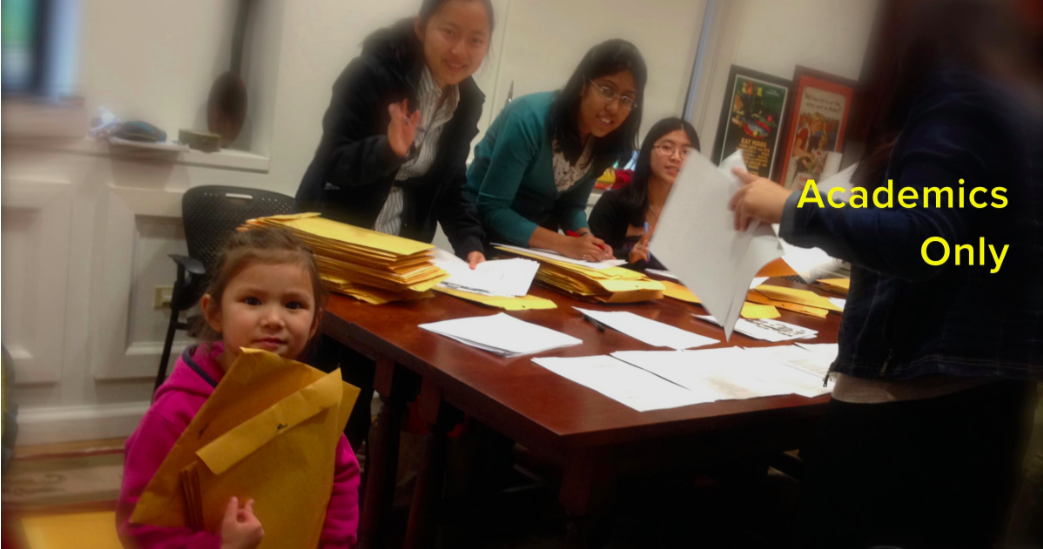Publish More Research
1. “The ‘P’ in PhD stands for Perseverance.” – The smartest and most talented people in PhD programs aren’t always the ones who graduate.
5. Do solution-focused research. Developing theory is prestigious, but coming up with a solution to an everyday problem is super gratifying. (Again, this is totally my personal preference and advice to myself.) [Read more]
6. Go to a different conference outside your field every year. Even if it’s an on-campus mini-conference in anthropology, you’ll learn a lot and it will keep you humble.
7. Leave town for your sabbatical. Moving is a hassle and there are 100 great reasons why you should spend your sabbatical at home (your spouse’s job, your kids, your doggy, your home, and so on). But I’ve never know anyone who went away who didn’t claim it was a career highlight. I’ve also never known anyone who spent their sabbatical at home and remembered anything about it two years later.
8. Writing a book is useful. Almost all academic authors are disappointed their books aren't cited more or sell more. Still, writing a book is worth it because it motivates you to organize, distill, and share what you understand about your topic, and they clarify the gaps you might want to fill in next.
4. Be a Visiting Professor. Suppose don’t get a good offer when you graduate from your PhD program (or you get turned down for tenure). If you “settle” for a tenure-track at a school you’re not crazy about, you’ll be perceptually anchored to that type of school by both you and by others. Being a 1- or 2-year visiting professor keeps you from getting anchored, gives you more time to strengthen your vita, and lets you swing again.
12. 90% of reviewers are great coaches. Reviewers have either made my papers better or they‘ve made me a better researcher. If it wasn’t for reviewers, some of my papers would have never been read by anyone other than me.
13. Create a Best Practices Guide for writing journal articles. – Find 30-40 favorite papers written by other researchers and list out the different strategies, tactics, and words you see them use (perhaps unconsciously) in their abstract, their opening-line, their first paragraph, their introduction, their background, theory section, tables, and so forth. When you’re finished distilling this, you’ll have a Best Practices guide that’s personalized to what you like in a paper and will be your writing guide. When I did this, my acceptance rate almost tripled. Also, papers became a lot easier and more fun for me to write.
14. Use a 2-2-2 strategy to unclog your pipeline. If a manuscript gets desk-rejected, I try to send it to the next journal within 2 days. If it gets conditionally accepted, I revise it and send it back within 2 weeks. If it gets a revise-and-resubmit that doesn’t require any additional studies, I send it back within 2 months.
15. Field studies are worth the hassle. They’re messy, hard to coordinate, inefficient, error-riddled, and harder to publish than lab studies. Still, they are usually much more memorable and impactful.
16. “Ideas are cheap; but execution is what pays.” Even a mediocre brainstorming session will generate 3-4 publishable ideas, and almost none will be followed up on. Edison said something like “Publishing in the Journal of [insert favorite journal here] is 1% inspiration and 99% perspiration.” Executing is what matters.
9. A Leave-of-Absence is Transforming. Again, this is about moving away and clearing your head. Leaving town to take a 1- or 2-year paid leave of absence is incredibly revitalizing to every single person I've known. It either gives you amazing confidence that you can hugely succeed at something else, or it gives you amazing appreciation for academia. Maybe both.
17. “You can either read a lot or you can write a lot, but you can't do both.”
18. "Write the first two hours of every day." The guy who told me this, pretty much said it like a command: no email, no breakfast, no class stuff. Before breakfast and before the kids wake up. It sets a productivity vibe for the whole day. [Read more]
19. Write down the 3 specific things you'll finish each day. Better to have three things completed than 20 things pushed ahead an inch. [Read more]
13. Create a Best Practices Guide for writing journal articles. – Find 30-40 favorite papers written by other researchers and list out the different strategies, tactics, and words you see them use (perhaps unconsciously) in their abstract, their opening-line, their first paragraph, their introduction, their background, theory section, tables, and so forth. When you’re finished distilling this, you’ll have a Best Practices guide that’s personalized to what you like in a paper and will be your writing guide. When I did this, my acceptance rate almost tripled. Also, papers became a lot easier and more fun for me to write.
5. Do solution-focused research. Developing theory is prestigious, but coming up with a solution to an everyday problem is super gratifying. (Again, this is totally my personal preference and advice to myself.) [Read more]
6. Go to a different conference outside your field every year. Even if it’s an on-campus mini-conference in anthropology, you’ll learn a lot and it will keep you humble.
7. Leave town for your sabbatical. Moving is a hassle and there are 100 great reasons why you should spend your sabbatical at home (your spouse’s job, your kids, your doggy, your home, and so on). But I’ve never know anyone who went away who didn’t claim it was a career highlight. I’ve also never known anyone who spent their sabbatical at home and remembered anything about it two years later.
8. Writing a book is useful. Almost all academic authors are disappointed their books aren't cited more or sell more. Still, writing a book is worth it because it motivates you to organize, distill, and share what you understand about your topic, and they clarify the gaps you might want to fill in next.
4. Be a Visiting Professor. Suppose don’t get a good offer when you graduate from your PhD program (or you get turned down for tenure). If you “settle” for a tenure-track at a school you’re not crazy about, you’ll be perceptually anchored to that type of school by both you and by others. Being a 1- or 2-year visiting professor keeps you from getting anchored, gives you more time to strengthen your vita, and lets you swing again.
12. 90% of reviewers are great coaches. Reviewers have either made my papers better or they‘ve made me a better researcher. If it wasn’t for reviewers, some of my papers would have never been read by anyone other than me.
13. Create a Best Practices Guide for writing journal articles. – Find 30-40 favorite papers written by other researchers and list out the different strategies, tactics, and words you see them use (perhaps unconsciously) in their abstract, their opening-line, their first paragraph, their introduction, their background, theory section, tables, and so forth. When you’re finished distilling this, you’ll have a Best Practices guide that’s personalized to what you like in a paper and will be your writing guide. When I did this, my acceptance rate almost tripled. Also, papers became a lot easier and more fun for me to write.
14. Use a 2-2-2 strategy to unclog your pipeline. If a manuscript gets desk-rejected, I try to send it to the next journal within 2 days. If it gets conditionally accepted, I revise it and send it back within 2 weeks. If it gets a revise-and-resubmit that doesn’t require any additional studies, I send it back within 2 months.
15. Field studies are worth the hassle. They’re messy, hard to coordinate, inefficient, error-riddled, and harder to publish than lab studies. Still, they are usually much more memorable and impactful.
16. “Ideas are cheap; but execution is what pays.” Even a mediocre brainstorming session will generate 3-4 publishable ideas, and almost none will be followed up on. Edison said something like “Publishing in the Journal of [insert favorite journal here] is 1% inspiration and 99% perspiration.” Executing is what matters.
9. A Leave-of-Absence is Transforming. Again, this is about moving away and clearing your head. Leaving town to take a 1- or 2-year paid leave of absence is incredibly revitalizing to every single person I've known. It either gives you amazing confidence that you can hugely succeed at something else, or it gives you amazing appreciation for academia. Maybe both.
17. “You can either read a lot or you can write a lot, but you can't do both.”
18. "Write the first two hours of every day." The guy who told me this, pretty much said it like a command: no email, no breakfast, no class stuff. Before breakfast and before the kids wake up. It sets a productivity vibe for the whole day. [Read more]
19. Write down the 3 specific things you'll finish each day. Better to have three things completed than 20 things pushed ahead an inch. [Read more]
13. Create a Best Practices Guide for writing journal articles. – Find 30-40 favorite papers written by other researchers and list out the different strategies, tactics, and words you see them use (perhaps unconsciously) in their abstract, their opening-line, their first paragraph, their introduction, their background, theory section, tables, and so forth. When you’re finished distilling this, you’ll have a Best Practices guide that’s personalized to what you like in a paper and will be your writing guide. When I did this, my acceptance rate almost tripled. Also, papers became a lot easier and more fun for me to write.


